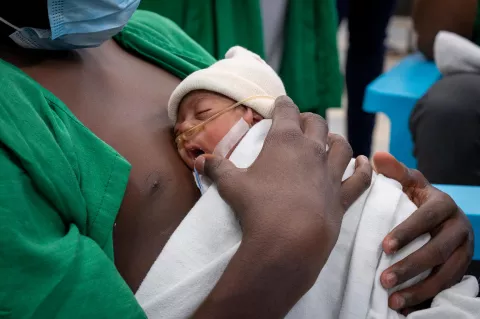Two years on, Danilo, the ‘badly cooked potato’ baby stands tall
A baby born with microcephaly, caused by Congenital Zika Syndrome.

- Available in:
- Español
- English
When a doctor tells you that you shouldn’t get too attached to your baby because he’s nothing more than a badly cooked potato, many people would crumble. But not the Perez family from Guatemala City. They’ve taken every ounce of negativity that that doctor uttered during Danilo’s diagnosis of Congenital Zika Syndrome, and turned it into a loving, caring, stimulating home where parents Sandra and Deyvi live with their four children Danilo, Dorien, Javi and Dennis.
Just over a year ago I had the privilege of spending several days with the Perez family, seeing the love and determination burning inside each one of them. The experience has left a lasting impression on me, and I’ve followed the progress of Danilo, as well as his friends Denisse, Angelito, Josep and Thiago via social media since we met. As we mark three years of Zika being declared a Public Health Emergency of International Concern, I wanted to know how this wonderful group of badly cooked potatoes were getting on.
‘Danilo is a smiley child’ beams his mother Sandra. ‘He particularly likes all the different sounds and noises he can hear, especially his brothers’ voices. Each of my boys are different. When Danilo wants a cuddle, he really wants a cuddle, so he definitely demands our attention! Dennis, my eldest, is very extrovert, Javi is incredibly kind and Dorien is the most restless. My children are my everything, they’re my lucky four-leaf clover: my fuel, my sunrise, my reason and my total happiness.’
One thing that strikes me about the Perez family is the bond that unites them. Uncles and grandparents and cousins and neighbours all pitch in. And whilst Danilo’s disability requires particular attention, each child is bathed in a boundless love from all the people that surround them. Sandra’s social media channels proudly show off each of her sons’ achievements from school graduations, to pretending to fly a plane, to the family bowling trip! And to think that they were told not to invest love in their youngest child because he was born with a disability.
‘I’d tell the doctor who told me that my son was a badly cooked potato, that Danilo is the very best recipe that God could ever think to create, particularly as my family love uncooked potatoes! We have the condiments to the perfectly cooked Danilo appetizer,’ Sandra continues. There’s no remorse, no anger, but a pragmatic understanding of the importance her whole family and community have in the development of each one of her children. Some days are tough, Danilo quite often has fits and people in the street stare or make rude comments. There are things that are harder for Danilo to achieve but the moments when he holds his neck up by himself, or when he swallows food or when, aided by his brothers, he stands on his feet make it all worth it.


At the same time, this family is bolstered by an incredible network of other families who also have children with a disability. Sandra co-founded Aliento, with Karen, the mother of Danilo’s friend Denisse. ‘The network with the other families who have children with disabilities is so important too,’ Sandra tells us. ‘We offer each other support, we share tips on what foods are easy to swallow, as well as ideas how to make easy and cheap toys for stimulation that can often be really expensive to buy. We still meet up regularly, and these moments are always a celebration for us. The other families are all in the same position, and we all believe in our role to support all our children so they develop to their full potential.’
The future is uncertain, but continued investment is needed.
Sandra dreams out-loud, ‘I see a future where there are systems for our babies that at the moment are very hard to come by, complete with the relevant therapies, materials and trained personnel that are needed.’
We don’t know what happens next. How will these children develop? Are early childhood services prepared to support children with disabilities, and their parents, in the medium to long term? What happens when these children reach school age? Three years on from the Zika outbreak we need to continue our work strengthening health and early childhood development services at national, local and community level by making all services more inclusive and prepared to receive children with disabilities. At the same time we must reinforce pyscho-social support systems for families, and strengthen family to family support networks. This means these families will learn to understand how they can enrich their daily routine in the home environment to help stimulate their child, play, sing songs to them and provide a loving, supportive and protective environment to help them achieve their full potential and acknowledge their abilities. For me, its heartwarming to see how the 1,000 days of love, opportunities and attention poured on Danilo by his parents and brothers is setting him up for the best start in life.
‘Danilo is growing, and becoming stronger every day surrounded by all the people who love him,’ concludes Sandra. Needless to say, he’s still the most brilliant badly cooked potato I’ve ever met.
#####
To read the original story click here.




